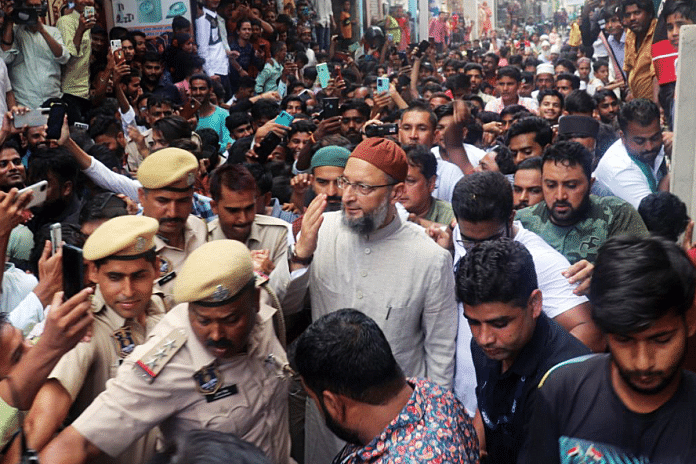Bengaluru: The Asaduddin Owaisi-led All India Majlis-e-Ittehadul Muslimeen (AIMIM) plans to contest around 25 seats out of the total 224 in the Karnataka election, joining several other smaller parties who have the potential to determine or derail poll outcomes.
In doing so, the Hyderabad-based party will join the likes of the Social Democratic Party of India (SDPI), the Gali Janardhana Reddy-led Kalyana Rajya Pragathi Paksha (KRPP), the Aam Aadmi Party (AAP) and several other smaller outfits who have decided to contest polls this time.
“The Congress has made us (Muslims) a vote bank for the last 70 years and done nothing else. The BJP is moving aggressively against us, whether it is Naqaab (Hijab), Triple Talaq, CAA… We are anti-Congress and anti-BJP,” AIMIM’s Karnataka president Usman Ghani told The Print.
The AIMIM will be contesting mostly in northern districts like Vijayapura, Hubballi, Raichur, Belagavi, Kalaburagi and even contemplating a seat in Bengaluru.
Victories in the 2021 urban local body polls give it some ground to challenge the larger parties, as there are close contests in several seats. The AIMIM has reached out to Janata Dal (Secular), or JD(S), for a pre-poll alliance but is yet to hear back from the regional outfit.
As for the Congress, it is likely to see the small outfits eat into its vote share. “Even in Uttar Pradesh, they (AIMIM) did not get more than 0.5 per cent votes. But, they can come with their propaganda, may spoil the environment with his (Owaisi) speeches and do reverse polarisation,” a Congress leader said.
Data shows that in at least four elections, voters showed a little support for Independents or small parties, barring a few in select constituencies. But with the exclusion of Muslims from the backward classes list turning into a hot potato, the chances of small parties that identify with the community have better opportunities to cash in.
In 2018, the BJP managed to win 104 seats with a vote share of 35.43 per cent. Similarly, the Congress got only 78 seats but recorded a higher vote share of 38.61 per cent. The JD(S) registered 37 wins with a vote share of 20.61 per cent (in seats it contested)
Overall, six national parties, eight state parties and 69 registered yet unrecognised parties were in the fray, indicating a 41 per cent increase in the number of outfits as compared to 2013.
Winning margins were thin in several seats, making each vote crucial in determining poll outcomes while each seat matters to cross the halfway mark in a state where coalition is the norm and majority a rarity.
Take the case of Maski: Congress’ Pratapgouda Patil won by a margin of just 213 votes in 2018. Similarly, Venkataramanappa of the Congress scraped through with a margin of 409 votes in Pavagada.
The non-recognised political parties, including Independents, managed to get 4.11 per cent of vote share in 2018. More importantly, the SDPI managed to secure 10.50 per cent of vote share even as the AIMIM backed the JD(S).
Also Read: In Congress list for Karnataka, former turncoat who campaigned for Kharge’s defeat in 2019
‘Test the waters’
While the SDPI has announced its intention to field candidates in 100 seats and the KRPP in 51, the AAP has decided to contest in all 224 seats.
“The first election is to check the waters, the second is to make someone lose and third is to win,” said a person closely associated with the AAP.
According to the Association for Democratic Reforms (ADR), the victorious candidates in 2018 won with an average of 36 per cent of the total registered voters. “This implies that the winners represent on average 36 per cent of the total electorate. In 2013, it was 32 per cent,” the ADR data show.
Even the big wigs have felt the impact of small parties eating into their votes. In 2019, JD(S) patriarch H.D. Deve Gowda lost at Tumakuru Lok Sabha constituency to a relatively unknown BJP candidate, G.S. Basavaraj, by a margin of just over 12,000 votes. The other candidates from small parties and Independents tallied 55,608 votes.
“In a close fight, even if they (small parties) can take away 3,000-4,000 votes, it’s a lot. That’s the role they play. They cannot win an election, but can certainly alter situations in different constituencies,” Bengaluru-based political analyst and faculty at the National Institute of Advanced Studies (NIAS) Narendar Pani said.
It will also be key to see whose votes they eat into and which party it eventually benefits, he added.
Both the Congress and the BJP have blamed each other for using small parties like the AIMIM and the SDPI for their own causes. In March, the SDPI said it had an ‘understanding’ with the Congress ahead of the 2018 election as the two joined forces to stop the BJP.
While it contested 23 seats and secured 3.27 per cent vote share in 2013, the SDPI pulled out of most seats in 2018 but still cornered 10.50 per cent votes in the three seats it eventually fought on. The party secured 45,781 votes and accounted for 0.12 per cent of total vote share in that election.
Both the SDPI and the AIMIM registered wins in the 2021 urban local body polls, indicating that they do have some presence on the ground.
“In the close fight constituencies, it can go anywhere since there are many seats which have neck-to-neck contests. So these things (small parties) do matter in splitting the votes. That’s the danger in about 50 constituencies,” Rizwan Arshad, the Congress legislator from Bengaluru, told The Print.
(Edited by Tony Rai)
Also Read: 6 factors that could sway Karnataka assembly results, from Modi to ‘misgovernance’



